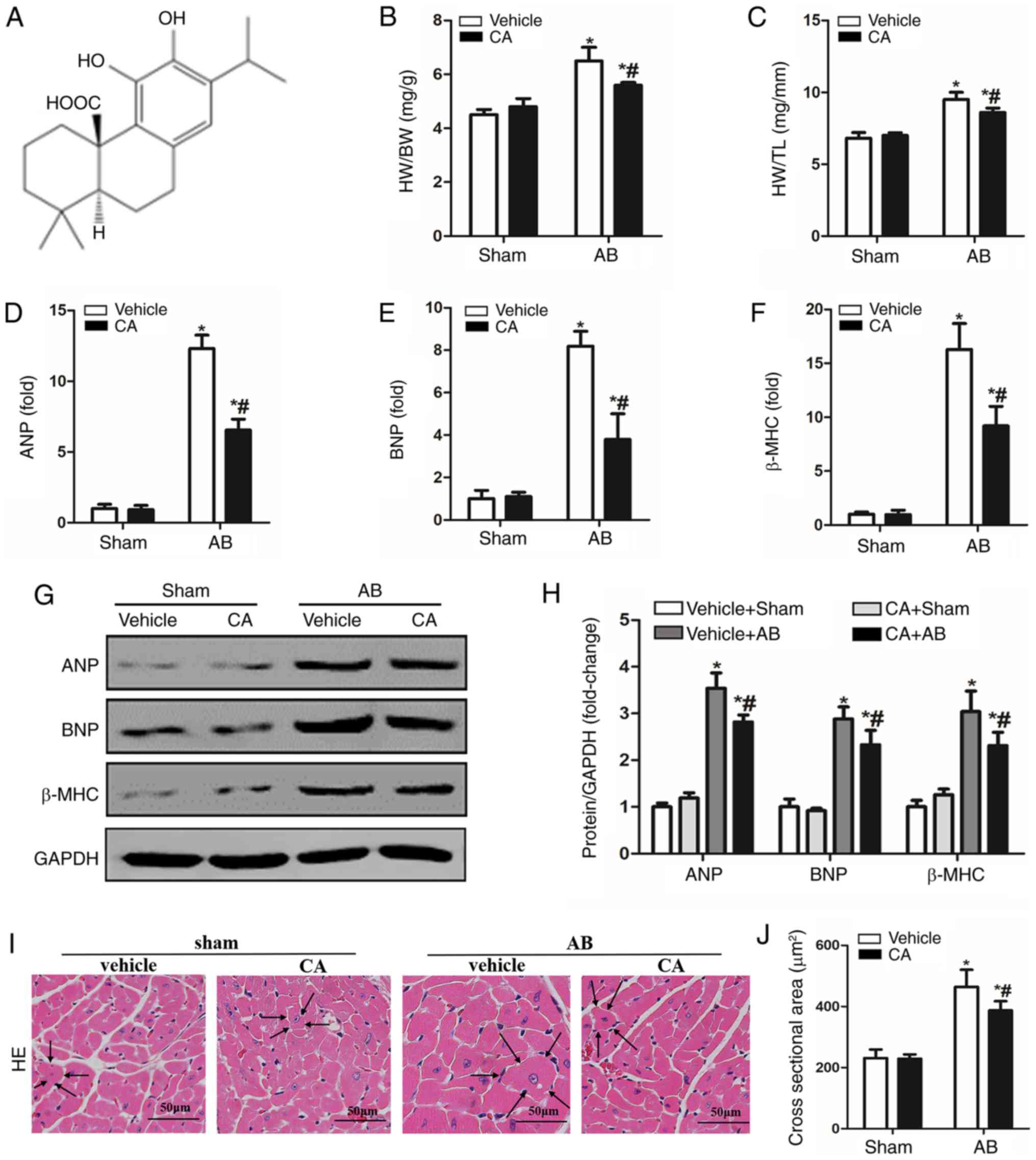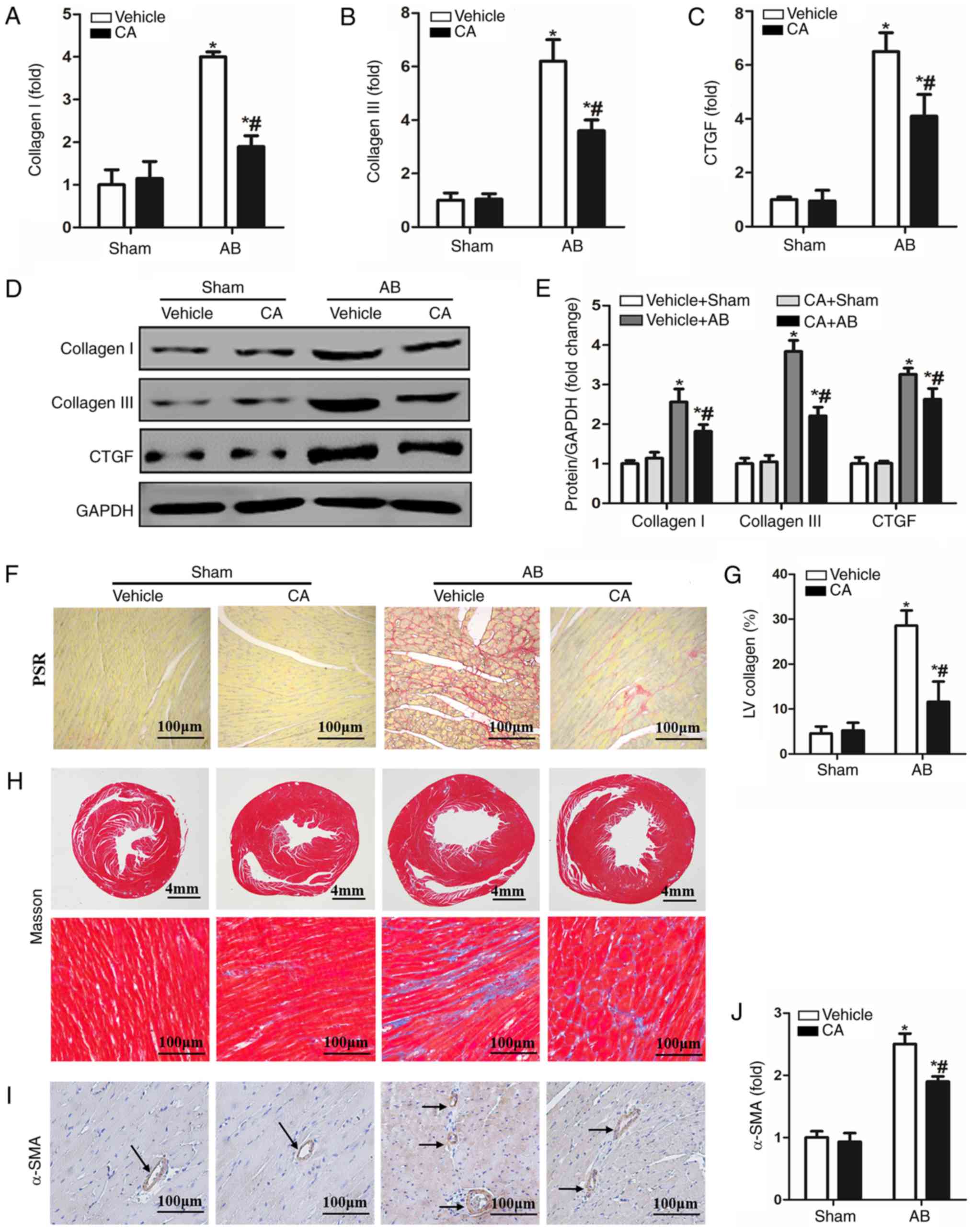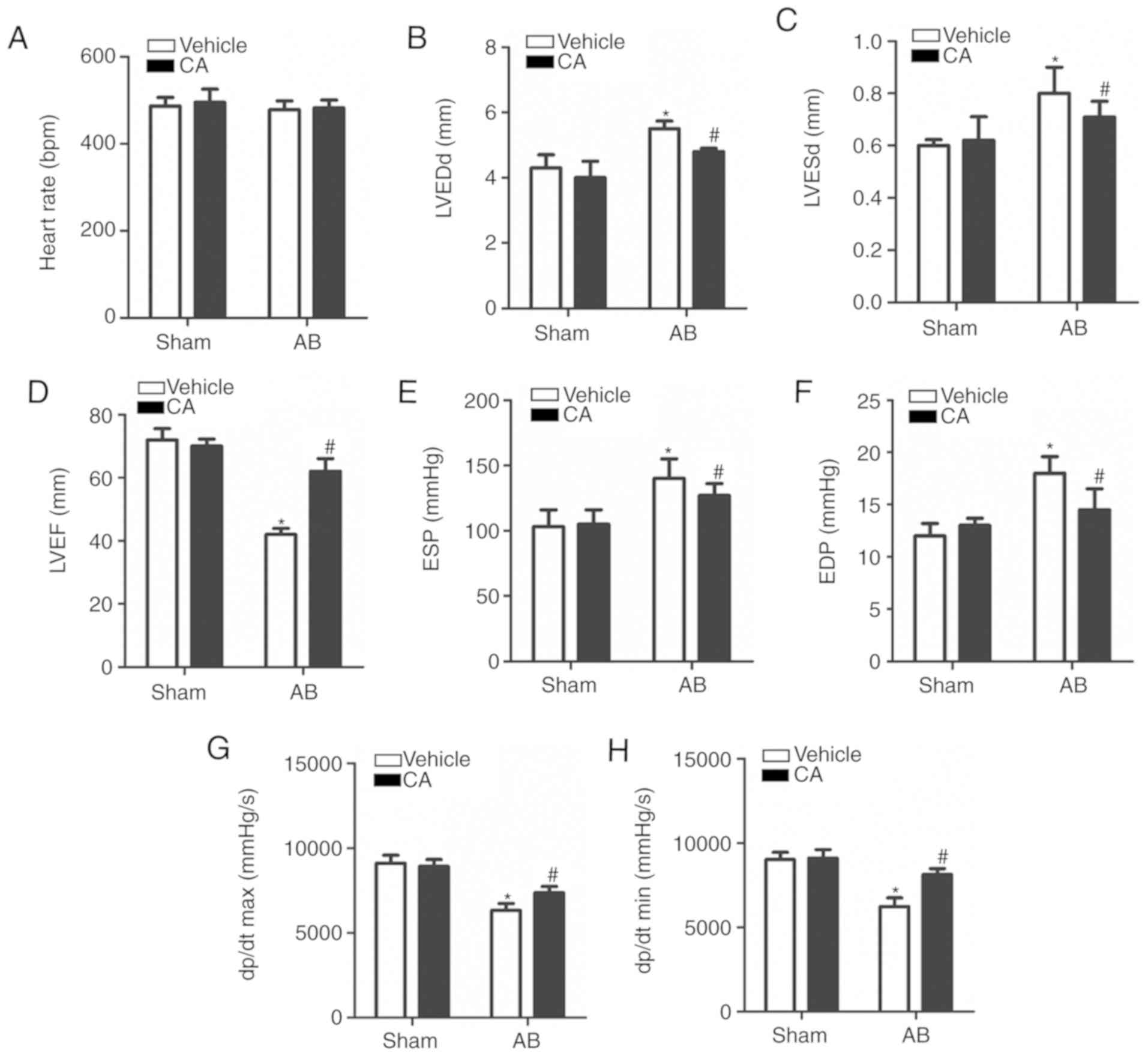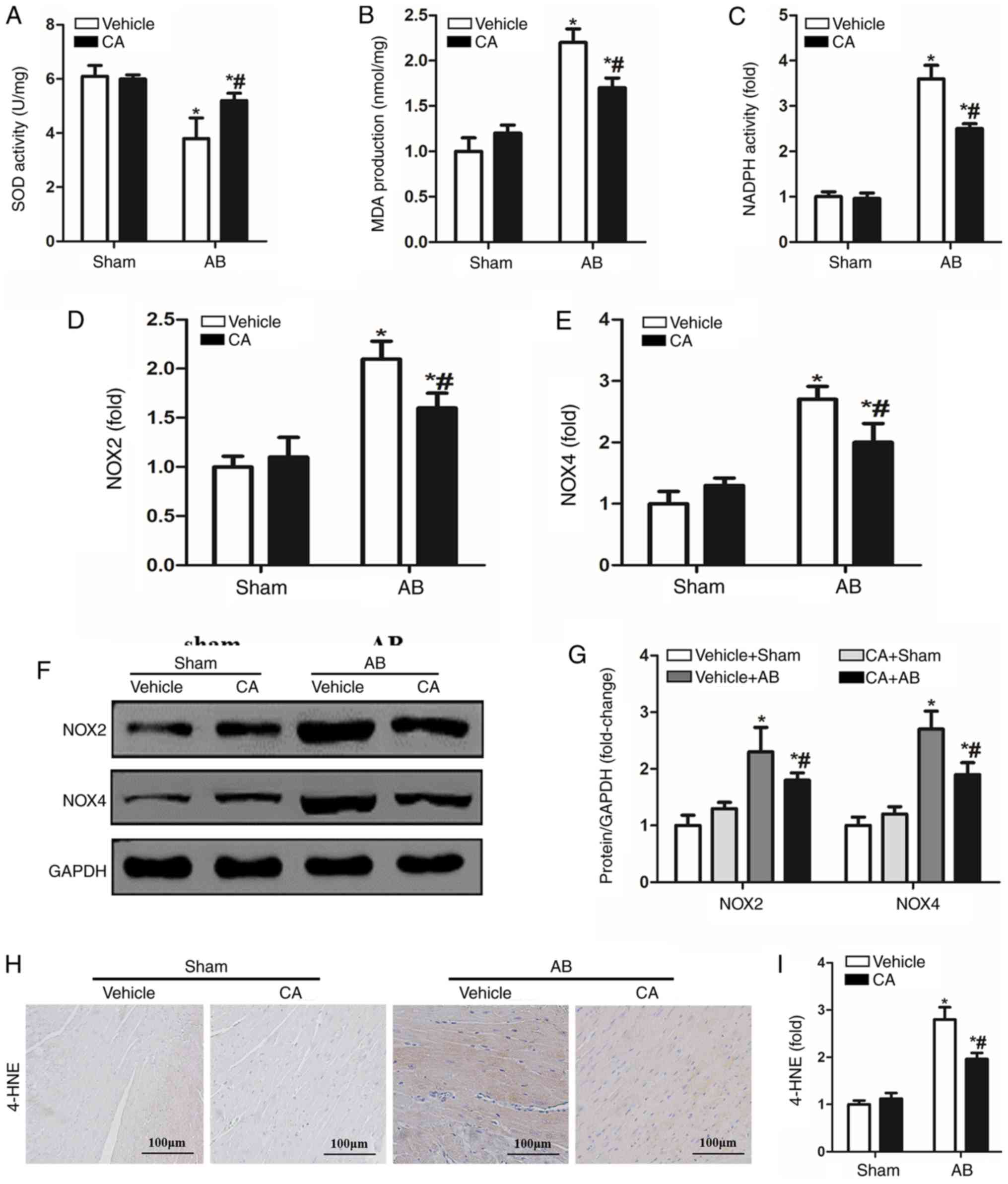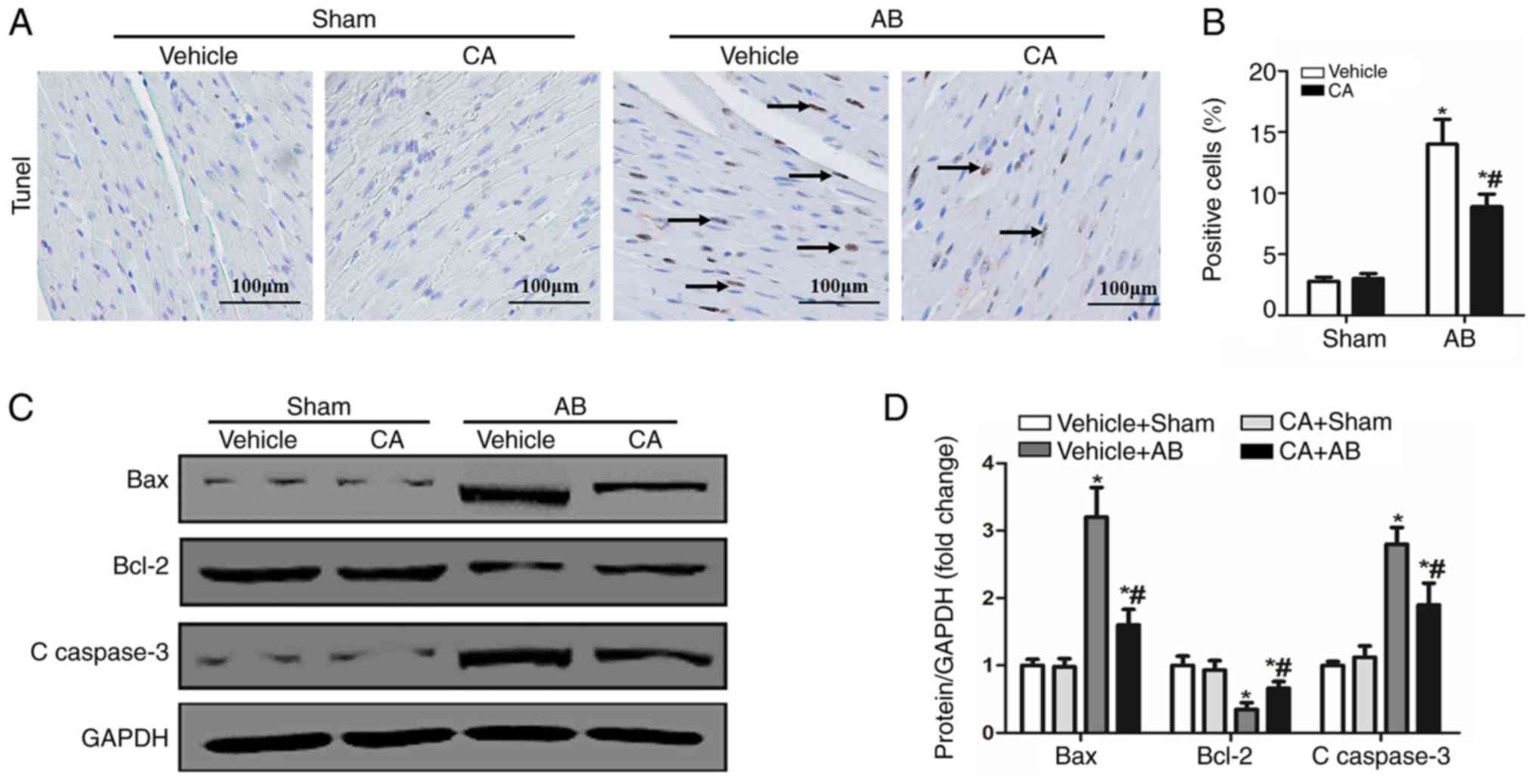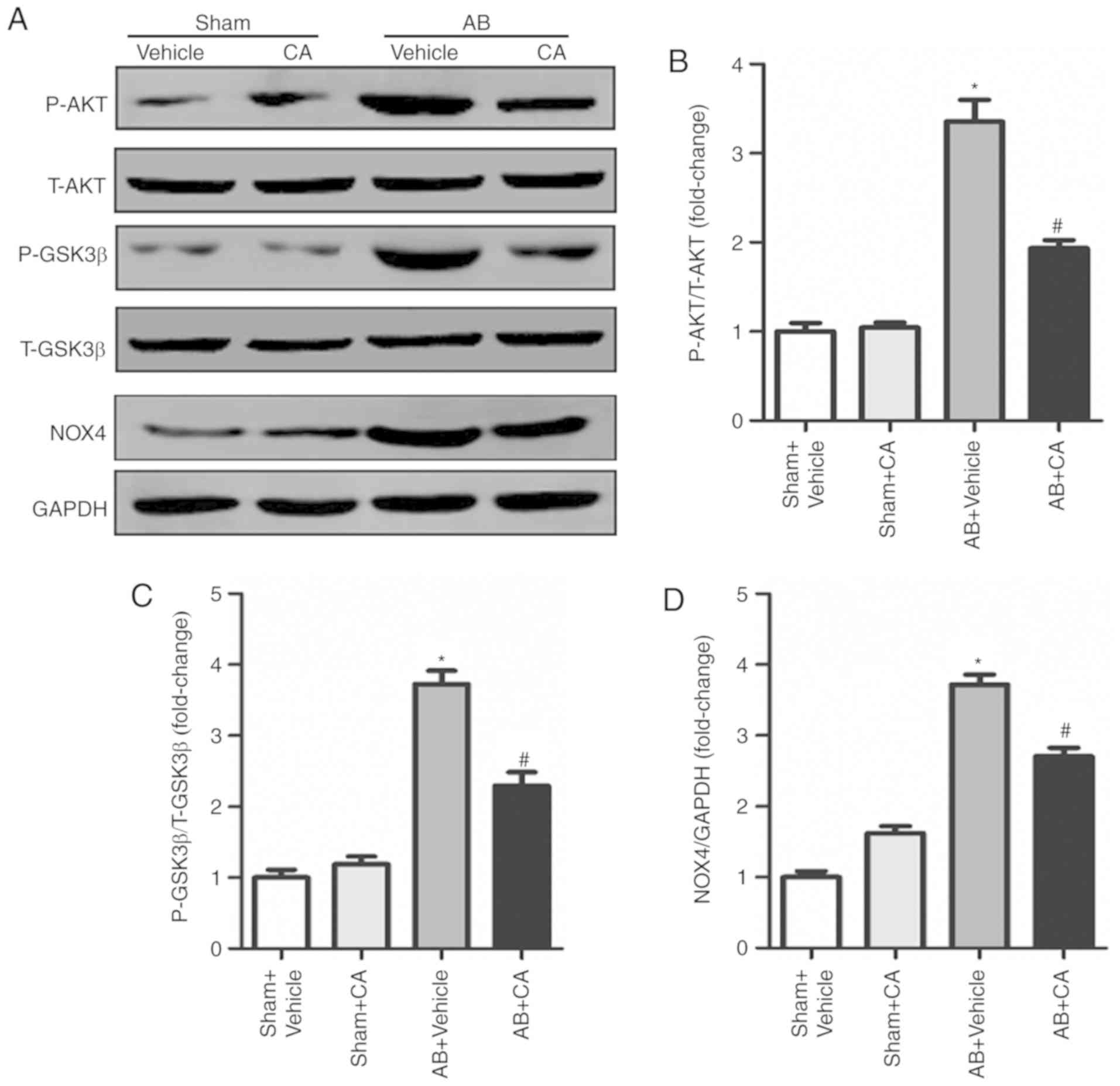|
1
|
Jaiswal A, Nguyen VQ, Carry BJ and le
Jemtel TH: Pharmacologic and endovascular reversal of left
ventricular remodeling. J Card Fail. 22:829–839. 2016.PubMed/NCBI View Article : Google Scholar
|
|
2
|
Wu QQ, Xiao Y, Yuan Y, Ma ZG, Liao HH, Liu
C, Zhu JX, Yang Z, Deng W and Tang QZ: Mechanisms contributing to
cardiac remodelling. Clin Sci (Lond). 131:2319–2345.
2017.PubMed/NCBI View Article : Google Scholar
|
|
3
|
Wang H, Sun X, Lin MS, Ferrario CM, Van
Remmen H and Groban L: G protein-coupled estrogen receptor (GPER)
deficiency induces cardiac remodeling through oxidative stress.
Transl Res. 199:39–51. 2018.PubMed/NCBI View Article : Google Scholar
|
|
4
|
Al-Darraji A, Haydar D, Chelvarajan L,
Tripathi H, Levitan B, Gao E, Venditto VJ, Gensel JC, Feola DJ and
Abdel-Latif A: Azithromycin therapy reduces cardiac inflammation
and mitigates adverse cardiac remodeling after myocardial
infarction: Potential therapeutic targets in ischemic heart
disease. PLoS One. 13(e0200474)2018.PubMed/NCBI View Article : Google Scholar
|
|
5
|
Eid RA, Alkhateeb MA, Al-Shraim M, Eleawa
SM, Shatoor AS, El-Kott AF, Zaki MSA, Shatoor KA, Bin-Jaliah I and
Al-Hashem FH: Ghrelin prevents cardiac cell apoptosis during
cardiac remodelling post experimentally induced myocardial
infarction in rats via activation of Raf-MEK1/2-ERK1/2 signalling.
Arch Physiol Biochem. 125:93–103. 2019.PubMed/NCBI View Article : Google Scholar
|
|
6
|
Sciarretta S, Yee D, Nagarajan N, Bianchi
F, Saito T, Valenti V, Tong M, Del Re DP, Vecchione C, Schirone L,
et al: Trehalose-Induced Activation of Autophagy Improves Cardiac
Remodeling After Myocardial Infarction. J Am Coll Cardiol.
71:1999–2010. 2018.PubMed/NCBI View Article : Google Scholar
|
|
7
|
Zhang M, Perino A, Ghigo A, Hirsch E and
Shah AM: NADPH oxidases in heart failure: Poachers or gamekeepers?
Antioxid Redox Signal. 18:1024–1041. 2013.PubMed/NCBI View Article : Google Scholar
|
|
8
|
Zhao QD, Viswanadhapalli S, Williams P,
Shi Q, Tan C, Yi X, Bhandari B and Abboud HE: NADPH oxidase 4
induces cardiac fibrosis and hypertrophy through activating
Akt/mTOR and NFκB signaling pathways. Circulation. 131:643–655.
2015.PubMed/NCBI View Article : Google Scholar
|
|
9
|
Zhang Y, Tocchetti CG, Krieg T and Moens
AL: Oxidative and nitrosative stress in the maintenance of
myocardial function. Free Radic Biol Med. 53:1531–1540.
2012.PubMed/NCBI View Article : Google Scholar
|
|
10
|
Das S, Joardar S, Manna P, Dua TK,
Bhattacharjee N, Khanra R, Bhowmick S, Kalita J, Saha A, Ray S, et
al: Carnosic acid, a natural diterpene, attenuates arsenic-induced
hepatotoxicity via reducing oxidative stress, MAPK activation, and
apoptotic cell death pathway. Oxid Med Cell Longev.
2018(1421438)2018.PubMed/NCBI View Article : Google Scholar
|
|
11
|
Liu M, Zhou X, Zhou L, Liu Z, Yuan J,
Cheng J, Zhao J, Wu L, Li H, Qiu H, et al: Carnosic acid inhibits
inflammation response and joint destruction on osteoclasts,
fibroblast-like synoviocytes, and collagen-induced arthritis rats.
J Cell Physiol. 233:6291–6303. 2018.PubMed/NCBI View Article : Google Scholar
|
|
12
|
Manoharan S, Vasanthaselvan M, Silvan S,
Baskaran N, Kumar Singh A and Vinoth Kumar V: Carnosic acid: A
potent chemopreventive agent against oral carcinogenesis. Chem Biol
Interact. 188:616–622. 2010.PubMed/NCBI View Article : Google Scholar
|
|
13
|
Li H, Sun JJ, Chen GY, Wang WW, Xie ZT,
Tang GF and Wei SD: Carnosic acid nanoparticles suppress liver
ischemia/reperfusion injury by inhibition of ROS, Caspases and
NF-κB signaling pathway in mice. Biomed Pharmacother. 82:237–246.
2016.PubMed/NCBI View Article : Google Scholar
|
|
14
|
Sahu BD, Putcha UK, Kuncha M, Rachamalla
SS and Sistla R: Carnosic acid promotes myocardial antioxidant
response and prevents isoproterenol-induced myocardial oxidative
stress and apoptosis in mice. Mol Cell Biochem. 394:163–176.
2014.PubMed/NCBI View Article : Google Scholar
|
|
15
|
Bénard L, Oh JG, Cacheux M, Lee A,
Nonnenmacher M, Matasic DS, Kohlbrenner E, Kho C, Pavoine C, Hajjar
RJ and Hulot JS: Cardiac stim1 silencing impairs adaptive
hypertrophy and promotes heart failure through inactivation of
mTORC2/Akt signaling. Circulation. 133:1458–1471. 2016.PubMed/NCBI View Article : Google Scholar
|
|
16
|
Li J, Kritzer MD, Michel JJ, Le A, Thakur
H, Gayanilo M, Passariello CL, Negro A, Danial JB, Oskouei B, et
al: Anchored p90 ribosomal S6 kinase 3 is required for cardiac
myocyte hypertrophy. Circ Res. 112:128–139. 2013.PubMed/NCBI View Article : Google Scholar
|
|
17
|
Jung KJ, Min KJ, Park JW, Park KM and Kwon
TK: Carnosic acid attenuates unilateral ureteral
obstruction-induced kidney fibrosis via inhibition of Akt-mediated
Nox4 expression. Free Radic Biol Med. 97:50–57. 2016.PubMed/NCBI View Article : Google Scholar
|
|
18
|
National Research Council (US) Committee
for the Update of the Guide for the Care and Use of Laboratory
Animals: Guide for the Care and Use of Laboratory Animals. National
Academies Press, Washington, DC, 2011.
|
|
19
|
Jiang DS, Liu Y, Zhou H, Zhang Y, Zhang
XD, Zhang XF, Chen K, Gao L, Peng J, Gong H, et al: Interferon
regulatory factor 7 functions as a novel negative regulator of
pathological cardiac hypertrophy. Hypertension. 63:713–722.
2014.PubMed/NCBI View Article : Google Scholar
|
|
20
|
Ma ZG, Yuan YP, Xu SC, Wei WY, Xu CR,
Zhang X, Wu QQ, Liao HH, Ni J and Tang QZ: CTRP3 attenuates cardiac
dysfunction, inflammation, oxidative stress and cell death in
diabetic cardiomyopathy in rats. Diabetologia. 60:1126–1137.
2017.PubMed/NCBI View Article : Google Scholar
|
|
21
|
Gao S, Ho D, Vatner DE and Vatner SF:
Echocardiography in mice. Curr Protoc Mouse Biol. 1:71–83.
2011.PubMed/NCBI View Article : Google Scholar
|
|
22
|
Troy BL, Pombo J and Rackley CE:
Measurement of left ventricular wall thickness and mass by
echocardiography. Circulation. 45:602–611. 1972.PubMed/NCBI View Article : Google Scholar
|
|
23
|
Wu QQ, Xiao Y, Jiang XH, Yuan Y, Yang Z,
Chang W, Bian ZY and Tang QZ: Evodiamine attenuates TGF-β1-induced
fibroblast activation and endothelial to mesenchymal transition.
Mol Cell Biochem. 430:81–90. 2017.PubMed/NCBI View Article : Google Scholar
|
|
24
|
Zhang N, Wei WY, Yang Z, Che Y, Jin YG,
Liao HH, Wang SS, Deng W and Tang QZ: Nobiletin, a polymethoxy
flavonoid, protects against cardiac hypertrophy induced by
pressure-overload via inhibition of NAPDH oxidases and endoplasmic
reticulum stress. Cell Physiol Biochem. 42:1313–1325.
2017.PubMed/NCBI View Article : Google Scholar
|
|
25
|
Ibarra-Lara L, Hong E, Soria-Castro E,
Torres-Narváez JC, Pérez-Severiano F, Del Valle-Mondragón L,
Cervantes-Pérez LG, Ramírez-Ortega M, Pastelín-Hernández GS and
Sánchez-Mendoza A: Clofibrate PPARα activation reduces oxidative
stress and improves ultrastructure and ventricular hemodynamics in
no-flow myocardial ischemia. J Cardiovasc Pharmacol. 60:323–334.
2012.PubMed/NCBI View Article : Google Scholar
|
|
26
|
Qin F, Patel R, Yan C and Liu W: NADPH
oxidase is involved in angiotensin II-induced apoptosis in H9C2
cardiac muscle cells: Effects of apocynin. Free Radic Biol Med.
40:236–246. 2006.PubMed/NCBI View Article : Google Scholar
|
|
27
|
Yang CJ and Yang J, Fan ZX, Zhang J, Liu
XW and Yang J: Diagnostic value of soluble ST2 in heart failure: A
meta-analysis. Bachu Med J. 1:52–59. 2018.
|
|
28
|
Liu JJ, Lu Y, Ping NN, Li X, Lin YX and Li
CF: Apocynin ameliorates pressure overload-induced cardiac
remodeling by inhibiting oxidative stress and apoptosis. Physiol
Res. 66:741–752. 2017.PubMed/NCBI View Article : Google Scholar
|
|
29
|
Li W, Wu X, Li M, Wang Z, Li B, Qu X and
Chen S: Cardamonin alleviates pressure overload-induced cardiac
remodeling and dysfunction through inhibition of oxidative stress.
J Cardiovasc Pharmacol. 68:441–451. 2016.PubMed/NCBI View Article : Google Scholar
|
|
30
|
Bryk D, Olejarz W and Zapolska-Downar D:
The role of oxidative stress and NADPH oxidase in the pathogenesis
of atherosclerosis. Postepy Hig Med Dosw. 71:57–68. 2017.PubMed/NCBI View Article : Google Scholar
|
|
31
|
Cangemi R, Calvieri C, Bucci T, Carnevale
R, Casciaro M, Rossi E, Calabrese CM, Taliani G, Grieco S, Falcone
M, et al: SIXTUS study group: Is NOX2 upregulation implicated in
myocardial injury in patients with pneumonia? Antioxid Redox
Signal. 20:2949–2954. 2014.PubMed/NCBI View Article : Google Scholar
|
|
32
|
Liu Y and Zhang J: Nox2 contributes to
cardiac fibrosis in diabetic cardiomyopathy in a transforming
growth factor-β dependent manner. Int J Clin Exp Pathol.
8:10908–10914. 2015.PubMed/NCBI
|
|
33
|
Hingtgen SD, Tian X, Yang J, Dunlay SM,
Peek AS, Wu Y, Sharma RV, Engelhardt JF and Davisson RL:
Nox2-containing NADPH oxidase and Akt activation play a key role in
angiotensin II-induced cardiomyocyte hypertrophy. Physiol Genomics.
26:180–191. 2006.PubMed/NCBI View Article : Google Scholar
|
|
34
|
Siu KL, Lotz C, Ping P and Cai H: Netrin-1
abrogates ischemia/reperfusion-induced cardiac mitochondrial
dysfunction via nitric oxide-dependent attenuation of NOX4
activation and recoupling of NOS. J Mol Cell Cardiol. 78:174–185.
2015.PubMed/NCBI View Article : Google Scholar
|
|
35
|
Matsushima S, Kuroda J, Zhai P, Liu T,
Ikeda S, Nagarajan N, Oka S, Yokota T, Kinugawa S, Hsu CP, et al:
Tyrosine kinase FYN negatively regulates NOX4 in cardiac
remodeling. J Clin Invest. 126:3403–3416. 2016.PubMed/NCBI View Article : Google Scholar
|
|
36
|
Somanna NK, Valente AJ, Krenz M, Fay WP,
Delafontaine P and Chandrasekar B: The Nox1/4 Dual inhibitor
GKT137831 or Nox4 knockdown inhibits angiotensin-II-induced adult
mouse cardiac fibroblast proliferation and migration. AT1
physically associates with Nox4. J Cell Physiol. 231:1130–1141.
2016.PubMed/NCBI View Article : Google Scholar
|
|
37
|
Deshpande M, Mali VR, Pan G, Xu J, Yang
XP, Thandavarayan RA and Palaniyandi SS: Increased
4-hydroxy-2-nonenal-induced proteasome dysfunction is correlated
with cardiac damage in streptozotocin-injected rats with
isoproterenol infusion. Cell Biochem Funct. 34:334–342.
2016.PubMed/NCBI View Article : Google Scholar
|
|
38
|
Sinha K, Das J, Pal PB and Sil PC:
Oxidative stress: The mitochondria-dependent and
mitochondria-independent pathways of apoptosis. Arch Toxicol.
87:1157–1180. 2013.PubMed/NCBI View Article : Google Scholar
|
|
39
|
Kumar D and Jugdutt BI: Apoptosis and
oxidants in the heart. J Lab Clin Med. 142:288–297. 2003.PubMed/NCBI View Article : Google Scholar
|
|
40
|
Sahu BD, Rentam KK, Putcha UK, Kuncha M,
Vegi GM and Sistla R: Carnosic acid attenuates renal injury in an
experimental model of rat cisplatin-induced nephrotoxicity. Food
Chem Toxicol. 49:3090–3097. 2011.PubMed/NCBI View Article : Google Scholar
|
|
41
|
Jung KJ, Min KJ, Park JW, Park KM and Kwon
TK: Carnosic acid attenuates unilateral ureteral
obstruction-induced kidney fibrosis via inhibition of Akt-mediated
Nox4 expression. Free Radic Biol Med. 97:50–57. 2016.PubMed/NCBI View Article : Google Scholar
|
|
42
|
Zhang S, Wang Z, Zhu J, Xu T, Zhao Y, Zhao
H, Tang F, Li Z, Zhou J, Gao D, et al: Carnosic acid alleviates
BDL-induced liver fibrosis through miR-29b-3p-mediated inhibition
of the high-mobility group Box 1/Toll-Like receptor 4 signaling
pathway in rats. Front Pharmacol. 8(976)2018.PubMed/NCBI View Article : Google Scholar
|
|
43
|
Meng P, Yoshida H, Tanji K, Matsumiya T,
Xing F, Hayakari R, Wang L, Tsuruga K, Tanaka H, Mimura J, et al:
Carnosic acid attenuates apoptosis induced by amyloid-β 1-42 or
1-43 in SH-SY5Y human neuroblastoma cells. Neurosci Res. 94:1–9.
2015.PubMed/NCBI View Article : Google Scholar
|
|
44
|
Shi B, Wang LF, Meng WS, Chen L and Meng
ZL: Carnosic acid and fisetin combination therapy enhances
inhibition of lung cancer through apoptosis induction. Int J Oncol.
50:2123–2135. 2017.PubMed/NCBI View Article : Google Scholar
|
|
45
|
Han NN, Zhou Q, Huang Q and Liu KJ:
Carnosic acid cooperates with tamoxifen to induce apoptosis
associated with Caspase-3 activation in breast cancer cells in
vitro and in vivo. Biomed Pharmacother. 89:827–837. 2017.PubMed/NCBI View Article : Google Scholar
|
|
46
|
Abeyrathna P and Su Y: The critical role
of Akt in cardiovascular function. Vascul Pharmacol. 74:38–48.
2015.PubMed/NCBI View Article : Google Scholar
|
|
47
|
Chaanine AH and Hajjar RJ: AKT signalling
in the failing heart. Eur J Heart Fail. 13:825–829. 2011.PubMed/NCBI View Article : Google Scholar
|
|
48
|
Barnes JL and Gorin Y: Myofibroblast
differentiation during fibrosis: Role of NAD(P)H oxidases. Kidney
Int. 79:944–956. 2011.PubMed/NCBI View Article : Google Scholar
|
|
49
|
Hecker L, Vittal R, Jones T, Jagirdar R,
Luckhardt TR, Horowitz JC, Pennathur S, Martinez FJ and Thannickal
VJ: NADPH oxidase-4 mediates myofibroblast activation and
fibrogenic responses to lung injury. Nat Med. 15:1077–1081.
2009.PubMed/NCBI View Article : Google Scholar
|















